
Days after drawing a red line for anti-Israel students who pitched tents in the heart of campus, Columbia University says talks to dismantle an anti-Israel encampment are still ongoing.
Columbia University President Nemat “Minouche” Shafik said no deal had been reached between school officials and protesting students. She also lamented that non-protesting students were forced to leave campus amid safety concerns.
“The University’s goal for the talks was a collaborative resolution with the protestors that would result in the orderly removal of the encampment from the lawn. The students also were asked to commit going forward to following the University’s rules, including those on the time, place, and manner for demonstrations and events,” Shafik said in a Monday statement.
She added: “To that end, since Wednesday, a small group of academic leaders has been in constructive dialogue with student organizers to find a path that would result in the dismantling of the encampment and adherence to University policies going forward. Regretfully, we were not able to come to an agreement.”
TRUMP SAYS 4 WORDS ABOUT ANTI-ISRAEL PROTESTS ON COLLEGE CAMPUSES AS ARRESTS SKYROCKET
Columbia’s officials have failed to negotiate the end of an encampment, advocating for financial disclosure and divestment from all companies tied to Israel and calling for a permanent cease-fire in Gaza. (Protesters at George Washington University )
The anti-Israel demonstration in New York City, which has become the epicenter of similar protests at elite colleges and universities across the U.S., has continued since April 18.
That following Tuesday, April 23, the university notified the agitators of a midnight deadline to reach an agreement to clear out of the encampment, pack up their tents and go home. Hours later, the university said it would give the students an additional 48 hours for negotiations. That deadline, too, came and went, but the university said there had been “progress” in the talks.
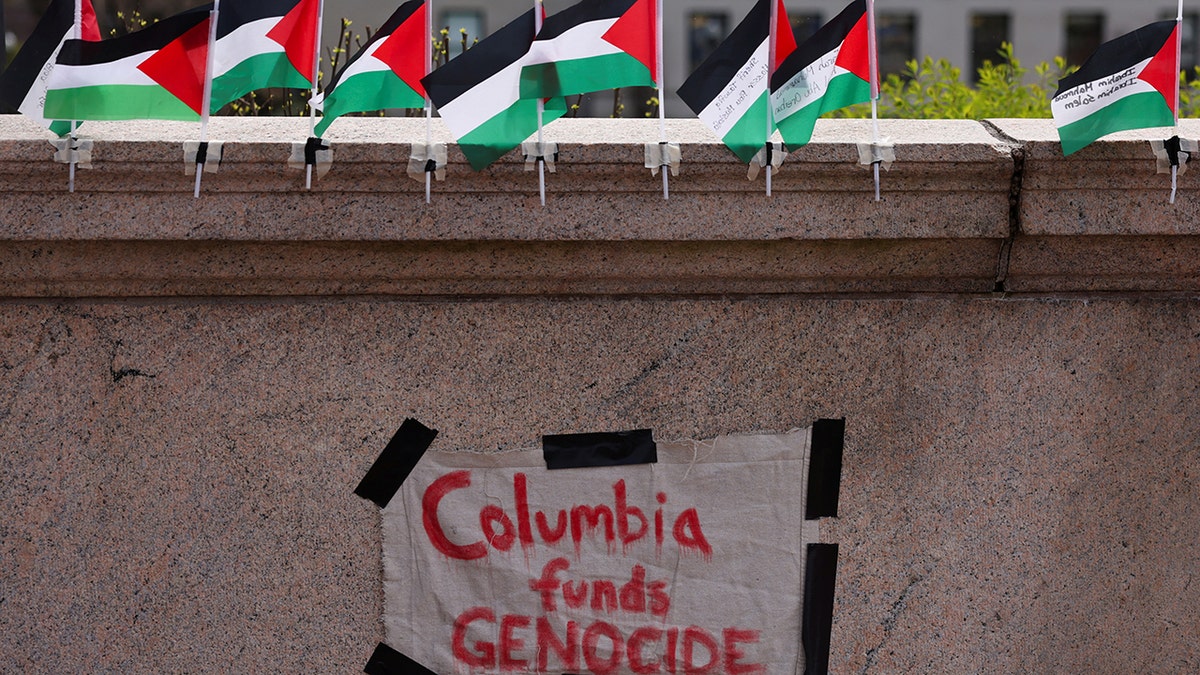
A sign is seen at Columbia University near a protest encampment on the main campus where students are protesting against Israel, which is at war with the terror group Hamas, in New York City, April 27, 2024. (REUTERS/Caitlin Ochs)
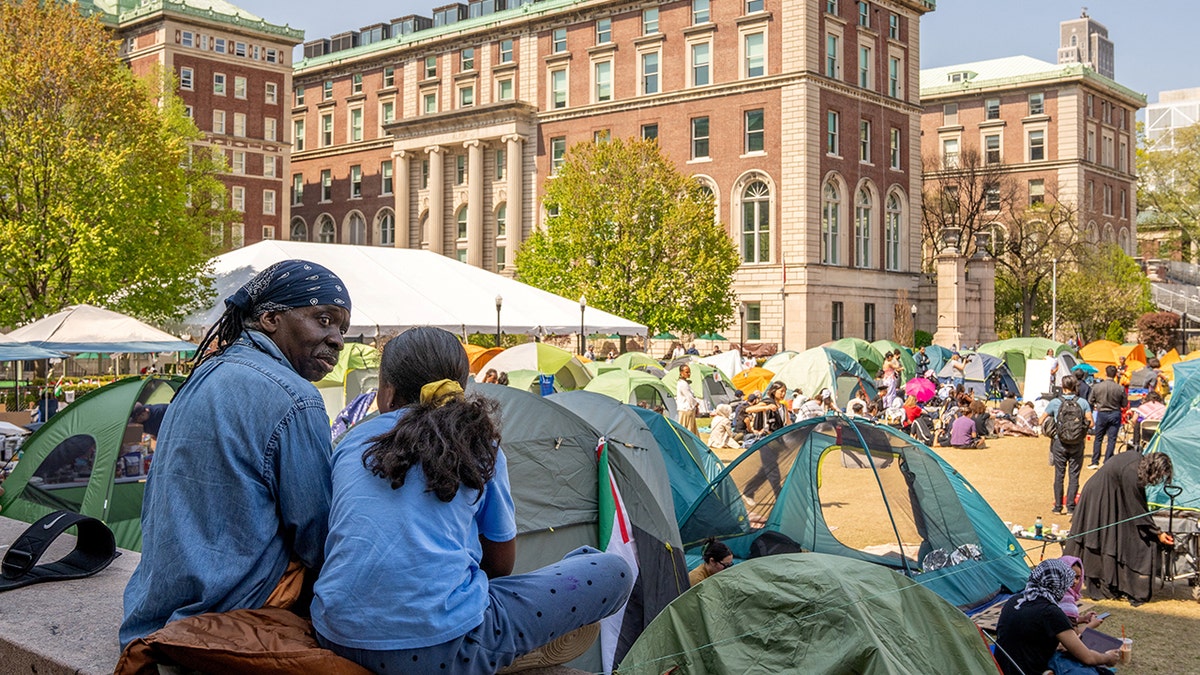
Students take part in a protest encampment on the Columbia University campus. The university has called on students to voluntarily disperse. (REUTERS/David Dee Delgado)
As the protest nears its two-week milestone, President Shafik said in Monday’s statement that the university was still committed to negotiations and to ensuring the safety of all those involved.
“Dear fellow members of the Columbia community, our University is committed to four core principles, which underpin all of our work and our shared values as a community: First, we must keep all members of our community physically safe on campus,” the president said.
It continued: “Second, we are committed to academic freedom and to ensuring that all members of our community have the right to speak their minds. Third, just as everyone at Columbia has the right to express their views, they also must respect the rights of others to do the same. As a result, protests must comply with time, place, and manner restrictions which, for example, prevent loud protests at night when other students are trying to sleep or prepare for exams. One group’s rights to express their views cannot come at the expense of another group’s right to speak, teach, and learn.”
And, “Fourth, our values—as well as our duties under civil rights laws—compel us to condemn hate and to protect every member of our community from harassment and discrimination. Antisemitic language and actions are unacceptable and calls for violence are simply abhorrent.”
The statement admitted that the actions of the anti-Israel agitators have, at times, engaged in antisemitic behavior that have left Jewish students feeling unsafe.
“The encampment has created an unwelcoming environment for many of our Jewish students and faculty,” the president plainly wrote. “External actors have contributed to creating a hostile environment in violation of Title VI, especially around our gates, that is unsafe for everyone—including our neighbors.”
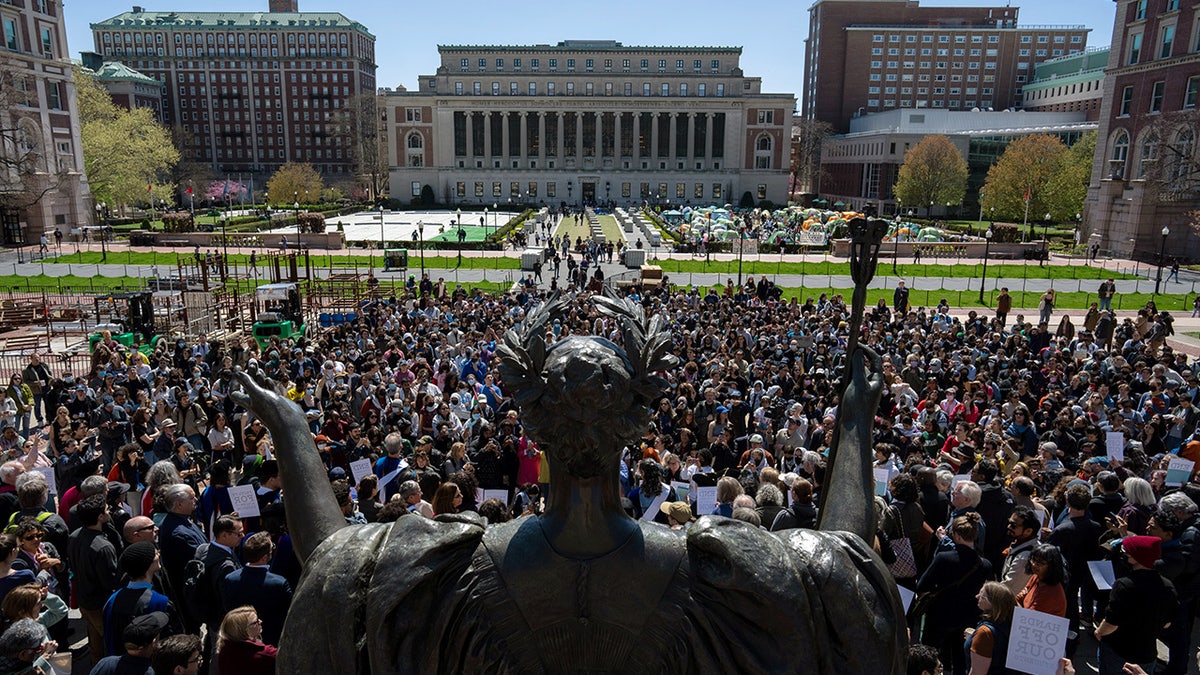
An anti-Israel rally is held at the steps of Lowe Library on the grounds of Columbia University on April 22, 2024 in New York City. Columbia University President Minouche Shafik lamented in a statement on Monday, Apil 29, that Jewish students felt unsafe at the school. (David Dee Delgado/Getty Images)
“I know that many of our Jewish students, and other students as well, have found the atmosphere intolerable in recent weeks,” Shafik said. “Many have left campus, and that is a tragedy. To those students and their families, I want to say to you clearly: You are a valued part of the Columbia community. This is your campus too. We are committed to making Columbia safe for everyone, and to ensuring that you feel welcome and valued.”
“We’ve worked hard to balance these principles,” she added.
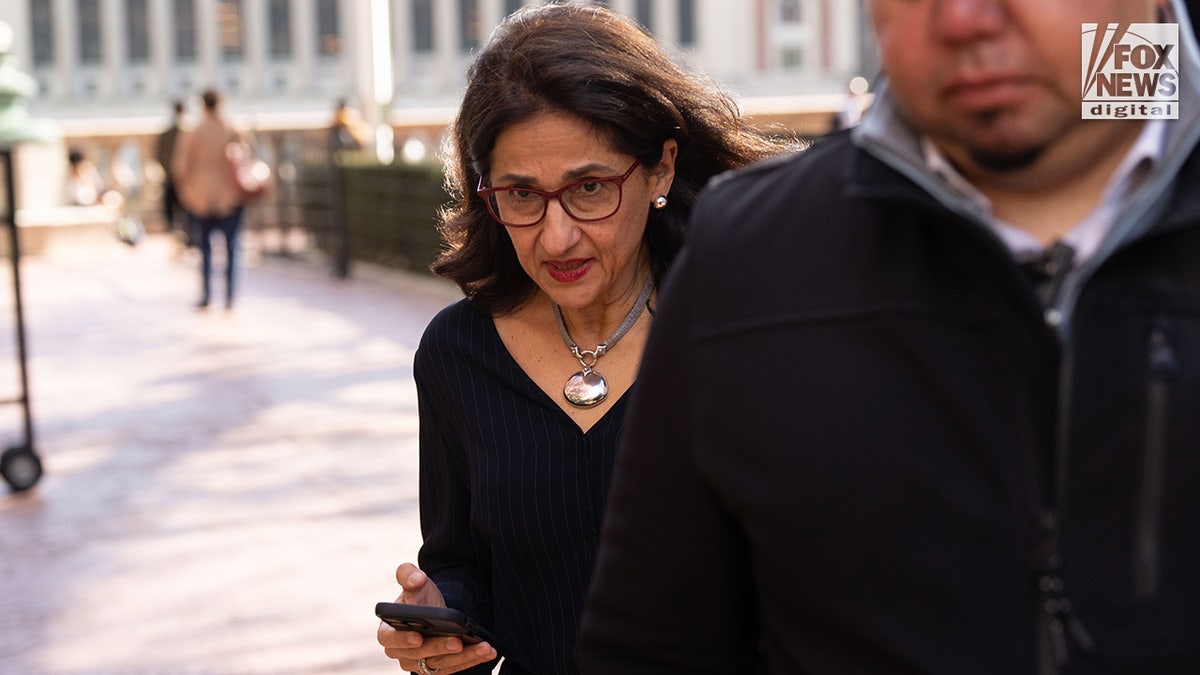
Columbia University president Minouche Shafik is under pressure to resign her post amid the ongoing antisemitic protest. (Fox News Digital)
The Columbia University president then provided some clarity about the negotiation process, including that the university would not end its financial support of Israel — a crucial request of those protesting.
“Both sides in these discussions put forward robust and thoughtful offers and worked in good faith to reach common ground. We thank them all for their diligent work, long hours, and careful effort and wish they had reached a different outcome,” Shafik said.
She added: “While the University will not divest from Israel, the University offered to develop an expedited timeline for review of new proposals from the students by the Advisory Committee for Socially Responsible Investing, the body that considers divestment matters. The University also offered to publish a process for students to access a list of Columbia’s direct investment holdings, and to increase the frequency of updates to that list of holdings.”
COLUMBIA UNIVERSITY ANTI-ISRAEL PROTESTERS: 5 DRAMATIC MOMENTS FROM A WEEK OF CHAOS
“Additionally, the University offered to convene a faculty committee to address academic freedom and to begin a discussion on access and financial barriers to academic programs and global centers. The University also offered to make investments in health and education in Gaza, including supporting early childhood development and support for displaced scholars. There are important ideas that emerged from this dialogue, and we plan to explore pursuing them in the future,” the president said.
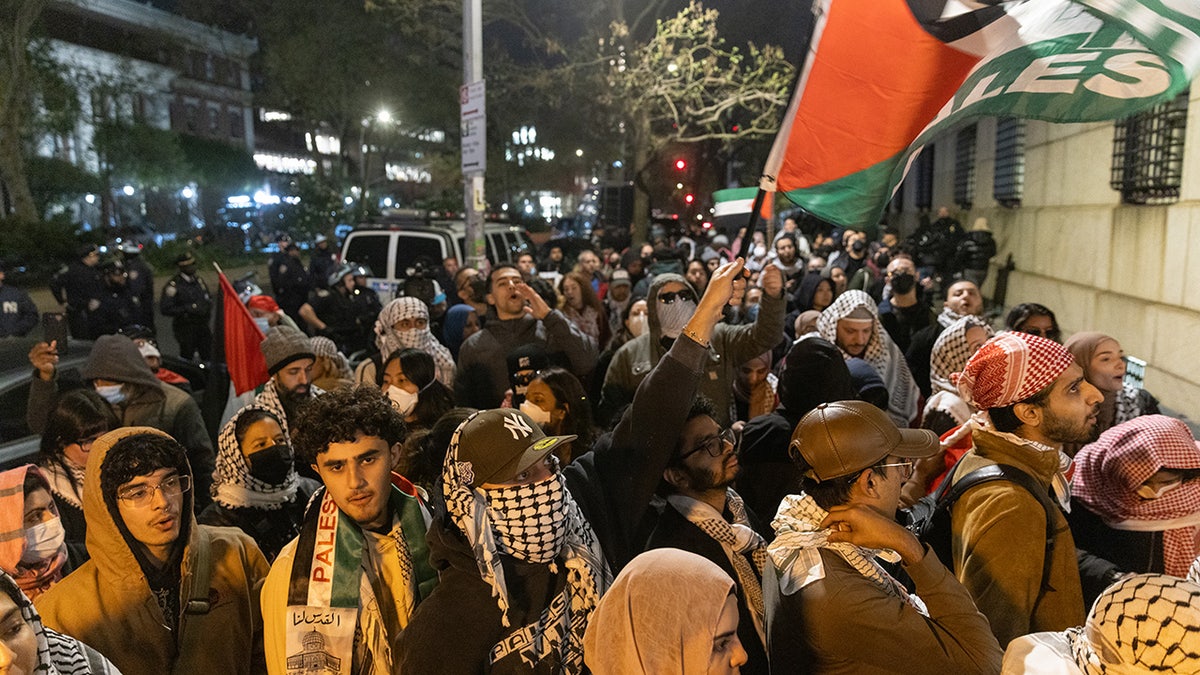
Anti-Israel students rallied outside Columbia University on April 23, 2024, in New York City. Columbia University President Minouche Shafik continues to call for students to protest peacefully, in accordance with the university’s rules. (Jeenah Moon/Getty Images)
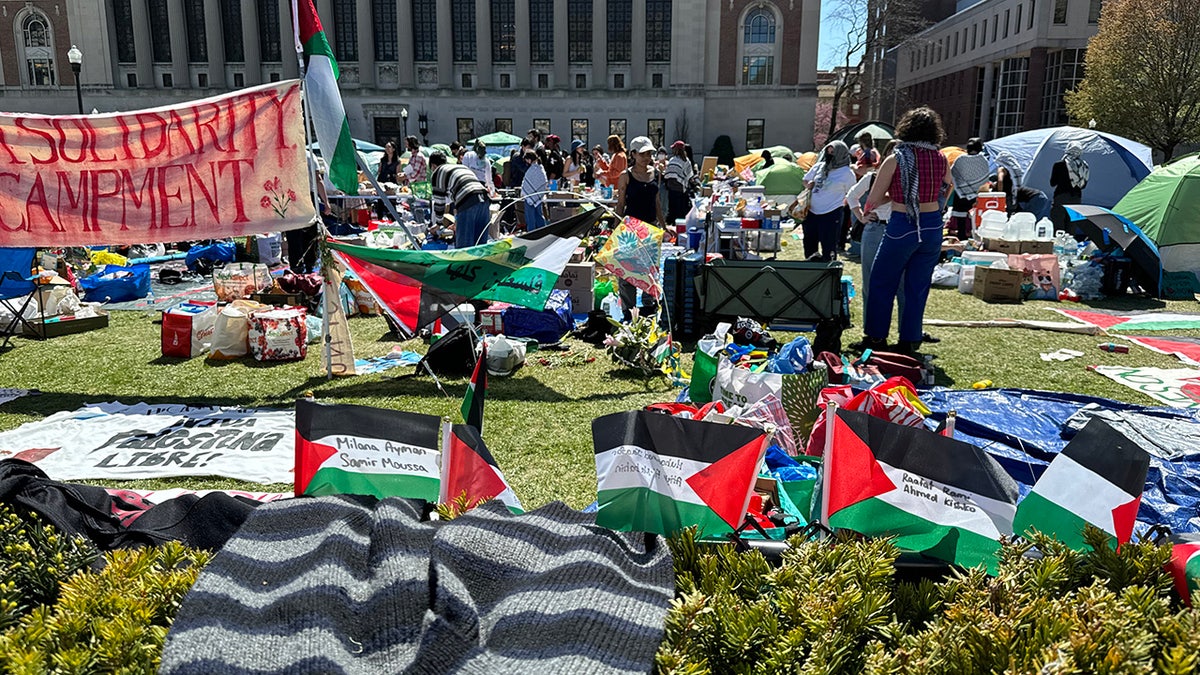
Anti-Israel protesters have erected tents in the heart of campus, forming an encampment in defiance of the university’s calls for them to disperse. (Peter Gerber)
Going forward, the university said it wishes to balance the students’ right to peacefully protest with the desire of other students who earned their right to graduate, to be able to do so.
“We have no intention of suppressing speech or the right to peaceful protest,” Shafik said. “We also do not want to deprive thousands of students and their families and friends of a graduation celebration.”
CLICK HERE TO GET THE FOX NEWS APP
She concluded: “For all of the reasons above, we urge those in the encampment to voluntarily disperse. We are consulting with a broader group in our community to explore alternative internal options to end this crisis as soon as possible. We will continue to update the community with new developments.”
The statement comes after more than 100 people were arrested at Columbia University and cited for trespassing. Hundreds of students have held similar protests at their schools across the country. They have subsequently faced similar criminal consequences.
The anti-Israel encampment was first formed on April 18.



















